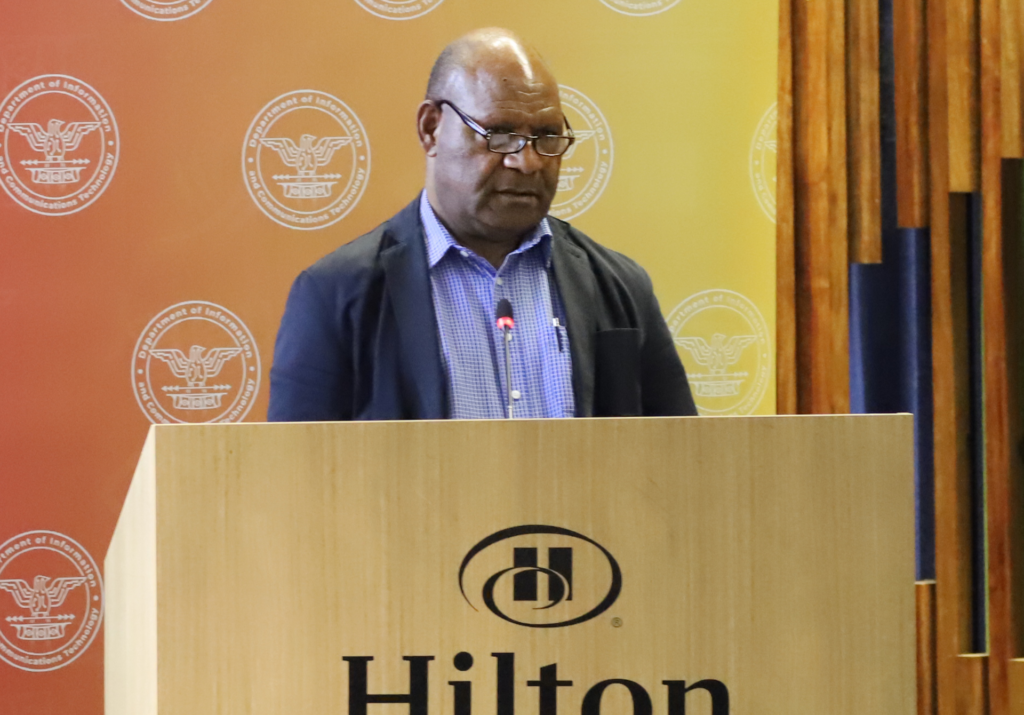August 11, 2023

Electoral Commissioner Mr Simon Sinai airing the major data related issues affecting the Electoral Commission, during the Consutation Workshop on Data Governance and Data Protection on Monday 7th August, 2023 at Hilton Hotel, Port Moresby
The Department of Information and Communications Technology (DICT) organized a productive consultation and validation workshop earlier this week August 7th, 2023 at the Hilton Hotel, Port Moresby, which brought together an array of key stakeholders from the data landscape of Papua New Guinea, sparking invaluable conversations on the role of data in driving digital government and development.
DICT Deputy Secretary Policy and Emerging Technology, Mr. Flierl Shongol, opened the workshop by posing a fundamental question to all attendees: “Why is data important?” In his address, Mr. Shongol underlined the transformative nature of data, emphasizing its newfound status as a valuable asset that propels the wheels of modern progress. Drawing a parallel between data and oil, he highlighted the pivotal role that data plays in shaping the course of development.
Addressing the key stakeholders, Deputy Shongol acknowledged the challenges arising from data coordination and asserted that the responsibility for effective data governance rests with those who oversee it. “We must recognize that effective data coordination is essential for our modern society,” he emphasized, highlighting the necessity for a comprehensive and strategic approach to data management.
Electoral Commissioner Mr. Simon Sinai, applauded Secretary Steven Matainaho for initiating such critical discussions on data management and control systems. Mr. Sinai candidly discussed the significant impact of data-related issues on the electoral processes, specifically focusing on the voting and database systems.
He urged the DICT to take a leading role in promoting the adoption of biometric voting, stressing the importance of managing data to ensure widespread benefits.
“We have 6,375 council wards, 331 Local Level Governments (LLGs), and 118 electorates now, but I want to know how many people living in these wards and electorates? Who is going to give me that information” Mr. Sinai posed the question to all stakeholders.
Mr Sinai added that DICT should capture these issues in its policies so there will be effective coordination, collection and management of this vital information, ensuring that every citizen can benefit from it.
Dr. Zigo, the First Assistant Secretary – Infrastructure Sector of the Department of National Planning, echoed similar sentiments during his address. He highlighted the need for better coordination among various data-related agencies, emphasizing that the newly discussed policy aims to address this issue. Dr. Zigo praised DICT’s role in promoting coordination, which he believed would eliminate duplication and streamline data-related initiatives.
The workshop also witnessed the insightful contribution of Mr. John Pora, Chairman of SME Corp of PNG, who urged for a citizen-driven approach to data management.
“While institutions might establish guidelines, the true impact and effectiveness of data management lie in the hands of citizens and their behavior,” Mr Pora stated.
Mr. Pora stressed the importance of imbuing data management with a purpose and function, asserting that this approach could lead to transformative changes in society and drive a knowledge-based economy.
Throughout the consultation and validation workshop, one central theme emerged: data’s far-reaching significance in modern governance and development. Stakeholders from diverse sectors emphasized the need for robust data governance policies, effective coordination among agencies, and a citizen-driven approach to data management.


